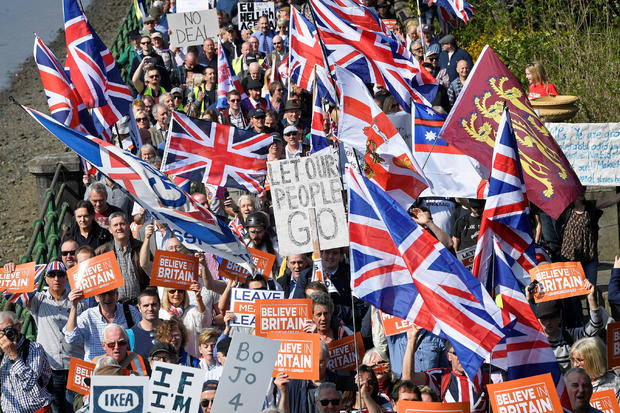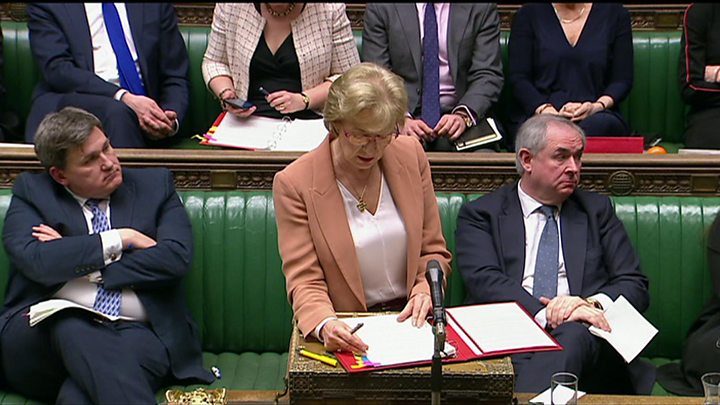• With Britain in political crisis and a new deadline to leave the European Union two weeks away, Parliament on Friday rejected, by a vote of 334 to 286, Prime Minister Theresa May’s Brexit plan for a third time.
• Lawmakers voted down the 585-page withdrawal agreement, which details Britain’s relationship to the European Union through the end of 2020.
• The vote means that Britain is moving closer to a withdrawal on April 12 without an agreement — the “no-deal” scenario that many economists and officials have warned would do serious economic damage. The only alternative may be a long delay, a move opposed by pro-Brexit lawmakers.
• In a bid to win over hard-line Brexit supporters, Mrs. May promised Conservative lawmakers this week that she would step down as prime minister if the deal were approved. She had hoped that enough lawmakers would reverse course, despite their concerns, rather than risk crashing out without a deal.

May is rejected for a third time, adding to political turmoil
British lawmakers on Friday rejected Prime Minister Theresa May’s plan for withdrawing from the European Union for the third time, leaving her policy in ruins and casting the nation’s politics into further confusion with the scheduled departure date looming two weeks away.
The vote on Friday might have been Mrs. May’s last chance to succeed on the issue that has dominated and defined her time in office, and the result left open an array of possibilities, including renewed demands for her resignation, early parliamentary elections and a second referendum.
The defeat, while narrower than in the previous two votes, appears to leave the increasingly weakened prime minister with two unpalatable options in the short run:
Britain can leave the bloc on April 12 without an agreement in place, a chaotic and potentially economically damaging withdrawal that threatens to leave the country with a shortage of food and medicine; or Mrs. May can ask European leaders — who have ruled out a short delay if her plan failed — for what would almost certainly be a long postponement.
“The implications of the house’s decision are grave,” she said after the vote, warning that it was not guaranteed that the bloc would give Britain more time.
The European Commission posted on Twitter, “ ‘No-deal’ scenario on 12 April is now a likely scenario.”
Hoping to win over Brexit hard-liners in her Conservative Party, Mrs. May promised lawmakers this week that she would step down if her plan were approved, giving the party a chance to choose a leader more to their liking to oversee the next round of negotiations. That got her some votes, but not enough.
Mrs. May has seen party discipline and her own authority shredded by successive parliamentary defeats, cabinet resignations and party defections over Brexit, and the vote on Friday left her even more battered — but apparently still in office.
In January, Parliament rejected her plan, 432 to 202 — a historic margin of defeat for a prime minister’s bill. A second vote on March 12 was another defeat, 391 to 242.
“If you want to deliver Brexit, this is the moment,” Mrs. May told Parliament before the vote.
But Parliament rebuffed her once again.
What exactly were lawmakers voting on?
Parliament has twice rejected Mrs. May’s proposal, but this time there was a twist: Lawmakers were only voting on the withdrawal agreement, the legally binding part of the deal.
They set aside a decision on the nonbinding “political declaration,” a statement of what both sides want in Britain’s long-term relationship with the European Union. The two parts were separated to get around a procedural rule that had complicated Mrs. May’s efforts at a third attempt to get the deal through.
Mrs. May told Parliament that if lawmakers approved the withdrawal agreement, they would still have an opportunity to vote for a larger bill that would include the agreement — an assessment some Labour members disputed.
The withdrawal agreement sets the terms of a transition period after Britain leaves the bloc, while long-term arrangements are negotiated. It would last through the end of 2020, but could be extended for two years.
[Interested in our Brexit coverage? Join the conversation on April 1, and hear how our reporters in London are tracking these updates.]
It lays out in detail the nation’s trade relationship with the bloc, keeping Britain tied, at least temporarily, to many European Union tariff, product and immigration rules, protecting trade ties and the rights of the bloc’s citizens who are already living in Britain.
This agreement also includes language dealing with the border between Ireland, a European Union member country, and Northern Ireland, a part of the United Kingdom — a confounding and divisive issue that has proved to be the biggest sticking point in Parliament.
At the moment, goods and people flow freely between Ireland and Northern Ireland. Under the withdrawal agreement, that arrangement would continue even if the two sides have not reached a long-term pact by the end of 2020, under a provision known as the backstop.
The backstop would keep Britain, and particularly Northern Ireland, tied to many European Union rules, to avoid building physical barriers on the border. That is anathema to many Brexit supporters, who fear that it could leave Britain permanently beholden to the bloc.
Prominent Brexit supporters vowed to back May’s deal
There was little expectation that Mrs. May’s plan would be approved, but in the hours before the vote a steady stream of lawmakers did promise to switch their votes and support her.
Dominic Raab, a former Brexit secretary and one of the most hard-line Conservative supporters of withdrawal, said on Friday that he would drop his opposition.
He was switching, he said, because there was “a significant risk of losing Brexit altogether,” referring to concerns that Britain might be forced to seek a longer extension, which would give opponents of Brexit more time to muster support to fight withdrawal.
Writing on Twitter, Boris Johnson, a former foreign secretary who has been an vocal critic of Mrs. May’s proposal, said that he would support it, although it was “very painful to vote for this deal.”
Iain Duncan Smith, a staunch Brexit supporter and a former leader of the Conservative Party, said that he would vote for the deal. Ross Thomson, who voted against it twice, also said that he would change his vote.
But Mrs. May’s prospects were largely dependent on how many opposition lawmakers she could win over, and she fell far short of that threshold.
Outside Parliament, little love for the E.U.
“Shame on you! Shame on you! Shame on you!”
With those words, pro-Brexit activists congregated outside Parliament on Friday morning, heaping anger on lawmakers who they said were thwarting the results of the 2016 referendum.
The crowd in the morning was sparse but grew as the day went on, with people drinking tea from thermoses, waving Union Jack flags and holding placards denouncing, among other things, “anti-British globalists.”
The protesters, most of them men, cut a striking contrast with the hundreds of thousands who turned out for an anti-Brexit march in London last weekend.
“We should be leaving now,” Paul Ellis, the legal officer of the For Britain Movement, said as he was walking toward Parliament Square. “As of today, Parliament no longer has the permission of the people to surrender power to the European Union.”
If Parliament votes to delay or stop Brexit, he said before Parliament acted on Friday, “It means that Britain is no longer a democracy.”
After arriving at Parliament Square, he unfurled his group’s banner in front of a statue of Winston Churchill.
Opposition complains that the government has made things less clear
What is a blindfold Brexit?
That is the name the opposition Labour Party has given to Mrs. May’s ploy of splitting her deal in two: a withdrawal agreement that gets Britain out of the European Union’s door, and a political declaration that says where it is supposed to go from there.
For tactical reasons, the Conservative government wanted Parliament to vote on them separately. But Labour leaders said that asking lawmakers to vote on the first, without the road map provided by the second, was like putting a blindfold on Parliament.
Making matters worse for Labour, Mrs. May promised to resign if her deal passed, leaving future negotiations in a new Conservative leader’s hands. That could very well be a hard-line Brexiteer, and Labour fears that such a leader would cut trading ties with Europe at the risk of hurting Britain’s economy.
“It could be a Boris Johnson Brexit, a Jacob Rees-Mogg Brexit, or a Michael Gove Brexit,” said Keir Starmer, a senior Labour lawmaker, referring to various pro-Brexit Conservatives.
Jeremy Corbyn, the Labour leader, compared that to playing “roulette with this country’s future.”
Some Labour members proposed an amendment to Mrs. May’s deal that would have given Parliament some say in shaping the political declaration — a way of taking off the figurative blindfold. But the speaker of the House of Commons did not select the amendment for a vote.
Some British news outlets reported on Friday that, in a desperate bid to win the backing of Labour members, the government was offering money to finance projects in their districts.
What comes next?
Like many moments in Britain’s prolonged journey, it’s not entirely clear.
Britain was originally set to leave the European Union on Friday, but European leaders agreed last week to a short extension.
Now that lawmakers have rejected it again, and if Britain takes no further action, it would withdraw on April 12 without an agreement — an option wanted by neither the European Union nor most British lawmakers.
Mrs. May could once again ask Brussels for more time. But European leaders have said that they would be open in such a case only to a long extension, possibly of a year or more, to allow for a fundamental rethinking of Britain’s position.
“The European Union have been clear that any further extension will need to have a clear purpose,” she said after the vote, and would require agreement by the heads of government of Britain and the other 27 member nations.
Minutes after Parliament defeated the plan, Donald Tusk, president of the European Council, one of the European Union’s governing bodies, announced that, in light of the vote, he was calling a council meeting on April 10.
A long postponement would require Britain to elect representatives to the European Parliament in voting that would take place from May 23 to 26 in all member states. If Britain chose not to take part, it would leave with no deal at 11 p.m. London time on April 12.
Both Labour and Scottish National Party leaders said that Mrs. May should call an early general election. The deadlock in London could force Mrs. May to go that route, and it could also build support for a second referendum.
In addition, Ian Blackford, the leader of the Scottish National Party, said, “We must now look seriously at the option of revocation” of Article 50, the provision of the Lisbon Treaty that Britain invoked to leave the European Union.
With Mrs. May’s promise to step down, approval of the agreement would have set off a fight among Conservatives to choose a new leader.
Many people in Britain and on the Continent are getting tired of the uncertainty. Among them is Jon Worth, a political consultant who has been making (and remaking) flowcharts to map the potential outcomes of the withdrawal process.
Mr. Worth, who works as a communications consultant for European politicians, has made 27 versions of his Brexit flowcharts, mapping every twist and turn in the political saga.
After a 2-year wait to celebrate ‘Independence Day’ … more waiting
For Brexit supporters, March 29 — the originally scheduled day of Britain’s official departure from the European Union — was supposed to be one big party, with a gala celebration at 11 p.m.
Big Ben, currently silenced by a renovation of the famous London clock tower, was to emerge from the scaffolding to chime Britain out of the European Union, sounding the death knell for 45 years of European integration. A commemorative coin was planned by the Royal Mint.
Either March 29 or June 23, the date of the 2016 referendum to leave the bloc, was supposed to be established as “Independence Day.” But the champagne is still on ice.
“I dearly wish we could be toasting Britain’s freedom with champagne at 11 p.m. on Friday, just as we’d planned,” said Allison Pearson, a columnist for the stridently pro-Brexit Daily Telegraph. “Under the circumstances, half a glass of Tizer and Nurofen is more like it,” she said, referring to a British soft drink and a painkiller.
Asked this month about the fate of the March 29 commemorative coins, the chancellor of the Exchequer, Philip Hammond, said he was unsure whether they had actually been made. If so, he told the BBC, “they will become collectors’ pieces.”
Who could be the next prime minister?
“I have heard very clearly the mood of the parliamentary party,” Mrs. May told Conservative lawmakers gathered in a meeting room in Parliament this week, as she announced plans to step aside if her Brexit plan were approved. “I know there is a desire for a new approach, and new leadership, in the second phase of the Brexit negotiations, and I won’t stand in the way of that.”
After the surprise offer on Wednesday, political analysts were quick to speculate about who might replace her. Her departure, which would not come before the May 22 withdrawal date, would leave the Conservative Party to select a new leader to see the process through.
Candidates for party leadership have to be nominated by two other members of Parliament, though if there is only one candidate, he or she automatically becomes the new leader. If more than two candidates emerge, lawmakers vote among themselves to narrow the field and then put two candidates to a vote by all party members, not just those in Parliament.
There is no obvious front-runner, but British bookmakers are already offering odds on some of the politicians they believe to be probable contenders for the job. They include hard-line Brexit supporters, vocal critics of the prime minister’s approach and supporters of her strategy.
Here’s a look at potential successors who have been given the best odds at clinching the role.
https://www.nytimes.com/2019/03/29/world/europe/theresa-may-brexit.html
2019-03-29 16:10:27Z
52780249686109





